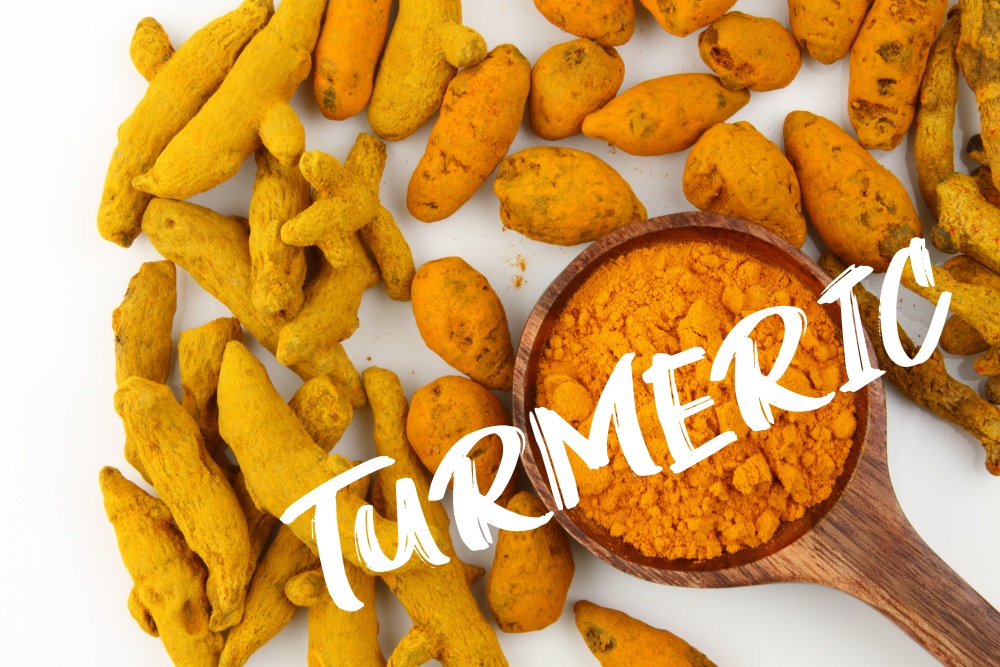There is a growing interest in people wanting to take control of their health and “longevity”. With this in mind, curiosity is growing surrounding the best “diet” for overall health and disease prevention. And of course, the jury is still out on whether or not there is a “perfect diet”. With that said, there is evidence that people who intake higher amounts of certain foods or spices, might have a small edge.
Turmeric, which starts out as curcumin, might have some health benefits. Therefore, in this article we will go through some of those potential health benefits and how to safely incorporate turmeric into your diet.
Types of Turmeric
Turmeric comes in many forms. Here’s a rundown of the most popular variants:
- Alleppey: 5% to 6.5% curcumin content
- Erode: 2.5% to 4.5% curcumin content
- Lakadong: 7% to 12% curcumin content
- Madras: Around 2% curcumin content
- Sangli: Up to 3.45% curcumin content
Health Benefits of Turmeric
The health benefits of turmeric or curcumin, the yellow pigment found in the spice, are a dime a dozen. Take a look at its top benefits:
Easing Depression
Low brain-derived neurotrophic factor (BDNF) is associated with depression.
If you have depression, taking curcumin could boost BDNF levels which has a small mount of evidence that this is linked to improved memory and learning. It may also increase the concentration of neurotransmitters like serotonin and dopamine, “happy hormones” that regulate mood, focus, and appetite.
According to a 2020 study, it inhibits the production of glutamate, in excitatory neurotransmitter, counteracting depression symptoms in a similar way as fluoxetine (Prozac) — an antidepressant.
Fighting Free Radicals
Curcumin can help prevent oxidative stress by eliminating different types of free radicals that cause cell damage and homeostatic disruption. It can also modulate the activity of glutathione peroxidase (GSH), and increase serum activities of other antioxidants, including superoxide dismutase (SOD) while battling oxidative stress.
Improving Memory
A 2018 research article showed the efficacy of a bioavailable form of curcumin on 40 subjects (ages 51–84). It showed improvements in learning, memory, and attention, likely brought on by a reduction in amyloid and tau accumulation in brain regions.
Improving Skin Health
Turmeric has anti-inflammatory, antibacterial, antifungal, and antimicrobial benefits. Hence, it may be beneficial for a variety of dermatologic diseases.
For example, a 2019 article showed its effectiveness in treating acne vulgaris. A gel infused with this spice has also been reported to improve the effects of photoaging. There’s also some evidence of oral curcumin being used for psoriasis, but further placebo-controlled studies are needed to support these findings.
Lowering the Risk of Heart Disease
Curcumin supplements can improve vascular endothelial function, which plays a significant role in regulating blood pressure and blood clotting.
Hence, it can be a promising nutraceutical in the prevention of cardiovascular diseases and reduce the risk of atherosclerosis development and progression. In fact, according to a 2012 study, it can even decrease the risk of heart attacks after coronary artery bypass grafting.
May Help Treat Rheumatoid Arthritis
Research in this area is limited, but a study conducted on humans reported curcumin could improve morning stiffness, walking time, and joint swelling.
Curcumin also has bone-protective mechanisms, making the plant beneficial in treating osteoporosis. This is backed by a pilot study that showed that the group who received curcumin had the highest percentage of improvement in overall Disease Activity Score (DAS) and American College of Rheumatology (ACR) scores.
Might Aid Cancer Prevention
Curcuminoids interfere with multiple cell signaling pathways, modulating cancer development and progression. A 2011 clinical trial reported a 40% reduction in aberrant crypt foci (ACF) in colorectal cancer that are believed to be precancerous lesions.
According to several studies, it can inhibit angiogenesis (growth of blood vessels that are associated with growth of cancer cells) and limit cancer cell metastasis, thereby reducing the risk of various malignant and benign cancers.
Preventing Eye Degeneration
Curcumin has neuroprotective properties so it can be an excellent therapy for the treatment of various eye diseases. This includes cataracts and glaucoma, eye conditions that damage the optic nerve and cause vision loss.
Treating Alzheimer’s
Turmeric can boost the levels of Brain-Derived Neurotrophic Factor (BDNF), a molecule that might have some association with the survival and growth of existing neurons.
As high levels of BDNF are associated with a lower risk of cognitive impairment, and curcumin can clear Abeta plaques — a neuropathological hallmark of Alzheimer’s, taking curcumin could lower the rate of cognitive decline in patients who have this disease. Of note, most of the evidence is in animal studies and report that further investigation is needed to confirm these findings
Treating or Preventing Diabetes
Curcumin can be used to prevent and treat diabetes, thanks to its positive effects on insulin resistance, hyperglycemia (high blood glucose), hyperlipidemia (high amounts of fatty substances in the blood), and islet apoptosis and necrosis.
However, most of these studies were conducted on animals, so its efficacy as a supplement should not be based on current research alone.
Uses of Turmeric: How To Consume This Ingredient
According to WHO, you need 1.4 mg of turmeric for every pound (0–3 mg per kg) of body weight, which should come to around one teaspoon a day.
There are many ways to incorporate it into your diet naturally, such as:
- Curry sauce
- Eggs
- Golden milk
- Grains
- Lentils
- Muffins
- Oatmeal
- Roasted veggies
- Scrambled eggs
- Smoothies
- Soups and stews
- Spice rubs or marinades
- Tea
Pro tip: Combine turmeric with black pepper. Black pepper contains “piperine,” which will improve the bioavailability of turmeric by 2,000%!
Turmeric as a Supplement
Curcumin has poor absorption, meaning not much of it reaches the body because compounds are broken down and eliminated quickly.
There is little evidence to support Turmeric supplements.
Conclusion
Turmeric can do wonders for your health, but it’s best to try and get your daily dose from food before turning to supplements.
Other Articles You Might Be Interested In:
Spending Time in Nature: Benefits & How to Get Started
In the digital age, people are glued to their phones at all hours of the day. Factor in sedentary lifestyles, and we are damaging our mental and physical well-being. This is why we all need to get out—we mean this in the kindest way possible. Spend time outdoors,...
Processed Foods: Balancing Convenience, Safety, and Nutrition
Today, people are eating more processed food compared to the past few decades—and it’s easy to see why. It’s conveniently available, making it an absolute time-saver in the kitchen. It’s also usually cheaper and tastier than whole, natural foods while offering a...
Decluttering: The Life-Changing Benefits of Tidying Up
One in 11 Americans have so many belongings that they have to pay a sweet $91.14 per month (on average) for storage space outside their homes. It’s not necessarily hoarding—sometimes, they just have difficulty parting with their prized possessions because of the...
Air Purifiers: Impact on health and disease
Our “environment” is one of many ways that it is possible to “leverage” health outcomes. In other words, decrease inflammation (correlated with many diseases) and optimize cell function. “Environmental air pollution has a direct impact on human health, being...
It’s True! Having a Sense of Agency Over One’s Health Can Increase Our Lifespan
Our resilience and it turns out—even our longevity—depends on having a sense of agency over one’s health. When we talk about a sense of agency, we’re referring to having a feeling of control over what happens to us. It’s important because it aids our mental stability,...
Benefits of Olive Oil and How To Use It in the Kitchen
Olive oil consumption is steadily increasing, and it’s easy to see why. It’s rich in antioxidants and omega-3s that keep your body in peak health. The oil is particularly beneficial in its least processed form: cold pressed extra virgin olive oil. The widespread...
Drink Your Way To Good Health With BEAM’s Super Greens
Finding it hard to meet your body’s nutritional needs? You’re not alone. According to the Dietary Reference Intakes, a staggering 92% of Americans suffer from at least one vitamin or mineral deficiency. Deficiencies for most nutrition indicators could be as high as...
Grounding Mats: A Groundbreaking Way To Embrace Good Health
If you’ve ever walked barefoot on the earth, you might have felt recharged and reinvigorated. This sensation isn’t a mere coincidence. Instead, the positive effects we feel when we let our feet touch the Earth’s natural surface—an activity called grounding or...
What Can Blue Zone Residents Teach Us About Life, Health, and Longevity?
Today, we have more scientists, doctors, and nurses. There are also larger investments in healthcare and wellness, more experimental treatments, and more research papers than ever. And yet our world remains riddled with disease and health conditions. Consider that in...
The Miracle of Faith: How It Can Help You Live Longer
“Religion” gets criticized and mocked, but nobody (not even science) can deny it can be good for you. For starters, a study of more than 1,500 newspaper obituaries from across the U.S. shows it can help you live 9.45 years longer than non-spiritual folks. But this...











